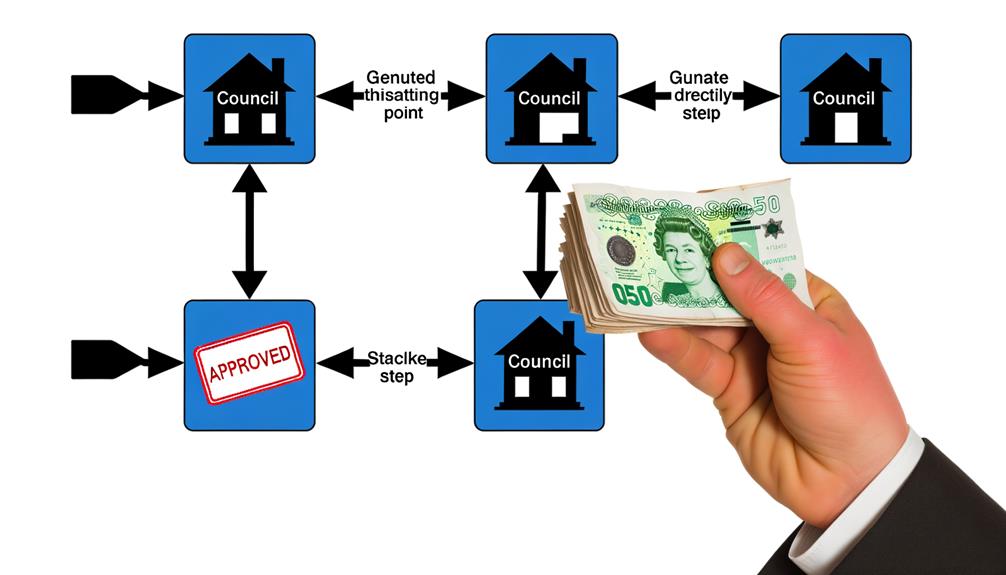The topic of purchasing one's council house for cash is one that warrants careful consideration. This is a viable option for many, thanks to the Right to Buy scheme, which allows council and housing association tenants to acquire their homes at a discounted rate.
However, it is not a decision to be taken lightly, nor is it one that should be made without a comprehensive understanding of all the variables involved, including the eligibility criteria, the application process, the potential discount, and any additional costs that may surface.
In the following discussion, we will attempt to shed light on these aspects, as well as the advantages and disadvantages of such a purchase, to better equip potential buyers with the information they need to navigate this complex process.
Key Takeaways
- The Right to Buy scheme allows council tenants to buy their homes at a discounted price, and a 'Right to Buy Calculator' can help determine eligibility and potential discount.
- Eligibility for the scheme requires being a secure tenant for at least three years, with the home being self-contained and serving as the tenant's primary residence.
- The application process involves completing and submitting the Right to Buy Application form, with local authorities or housing associations assessing eligibility criteria and providing an offer price.
- Financial considerations include additional costs such as solicitor fees and Land Registry charges, and seeking professional advice is recommended. Careful deliberation and informed judgment are necessary, considering long-term plans and financial means.
Understanding Council House Purchases
The acquisition of council houses—a process often laden with intricate legalities and financial implications—demands a comprehensive understanding to ensure a smooth and beneficial transaction.
The 'Right to Buy Scheme' is a government initiative that enables council tenants to buy their council homes at a discounted price. However, the application process to buy your council home can be complex.
To facilitate the process, potential buyers can use a 'Right to Buy Calculator'. This tool helps determine eligibility and the possible 'Right to Buy' discount that one might receive. Understanding these elements is crucial before choosing to 'Buy my Council House' or apply to buy a housing association property.
Moreover, housing association tenants also have the opportunity to buy their homes under the 'Right to Buy' scheme, although their eligibility criteria might differ slightly from council tenants.
Regardless, both council and housing association tenants should ensure they have a thorough understanding of the process, the financial implications, and their individual rights before they decide to buy their homes. It's not just about owning a home—it's about securing a space where you truly belong.
Eligibility Criteria for Buying
Shifting our focus from the general understanding of council house purchases, it becomes crucial to examine the eligibility criteria for buying under the 'Right to Buy' scheme. This scheme offers Council and housing association tenants the opportunity to buy their home at a discounted rate, creating a sense of belonging and ownership.
- Tenure: The Right to Buy scheme is open to public sector tenants who have been secure tenants for a minimum of three years. This requirement ensures that only long-term, committed tenants are given the opportunity to buy their homes.
- Property Type: The home must be self-contained and serve as the tenant's primary residence. This stipulation ensures that the scheme benefits individuals and families who have built their lives around their housing.
- Landlord: The landlord must be a public sector entity. This rule safeguards the scheme's purpose of enabling public sector tenants to transition into homeownership.
While the 'Right to Buy' scheme provides an avenue for tenants to buy their council house, it is important to remember that additional costs may surface when buying for cash. It is advisable to understand your rights, options, and be prepared for potential challenges.
The Application Process Explained

Navigating the application process for the 'Right to Buy' scheme necessitates a meticulous understanding of each step involved, starting with the completion and submission of the Right to Buy Application form (RTB1 Notice) to your landlord. This initial stage is instrumental for those wishing to buy their council home.
The next phase involves a comprehensive assessment by your local authority or housing associations to determine if social housing eligibility criteria are met. The landlord's response, typically within four to eight weeks, includes a calculated offer price, often at a discounted rate, detailed property description, and service charge particulars.
Should you find the offer unsatisfactory or inaccurate, an independent valuation can be requested. A twelve-week window is then provided for you to either accept this revised valuation or withdraw from the Right to Buy buying process.
The application process explained here underscores the importance of understanding all legal and financial aspects involved in purchasing council homes. It is also crucial to prepare for potential challenges that may arise during the process. Seek professional guidance and assistance to ensure a smooth, successful transaction.
Delving Into the Right to Buy Discount
Building on the understanding of the application process, it is essential to dissect the financial aspect of the Right to Buy scheme, particularly the significant discounts offered to eligible tenants. This opportunity to buy your council home at a discount is known as the Right to Acquire.
- The discount for qualifying tenants is calculated based on the number of years as a tenant, type of property, and location. This discount can range from 35% to 70%, with a cap set by the government.
- To qualify for Right to Buy, tenants must have been living in their property for a minimum of three years. This can be as part of a joint application or individually.
- The landlord is required to respond to the application within four to eight weeks, outlining the offer which includes the calculated discount.
Securing this discount is a significant step towards home-ownership, making it more accessible for many. However, it is crucial to consider the overall financial implications, including additional costs such as solicitor fees and Land Registry charges. Therefore, seeking professional advice is always recommended.
Your Landlord's Offer: Decision Time

Upon receiving the landlord's offer, a crucial period of decision-making commences, where tenants must meticulously analyze the proposed terms, including the calculated discount, property details, and associated service charges, within the stipulated 12-week period. This period is an essential opportunity to decide whether to buy the house or potentially sell your home within the given time frame.
The landlord agrees to sell you the type of property you're residing in, be it your mums council house or your own. However, the offer is not a simple sum; it encompasses more elements. You need a deposit, and there may be additional expenses such as conveyancing fees, Land Registry charges, and potential survey costs.
It is advisable to seek independent financial advice to ensure you understand the full implications of the purchase. Buying a property, especially one you have a personal connection to, can be a significant step towards a sense of belonging and security. However, it is a decision that requires careful deliberation and informed judgement.
The property you're buying should serve your long-term plans and fit within your financial means.
Unpacking Deposit Requirements
Diving into the complexities of deposit requirements, it is pivotal to understand that while a deposit may not be mandatory for securing a mortgage, tenants should be prepared for additional costs such as solicitor fees and survey charges. These charges are a part of the process to buy your home, regardless of whether it is a freehold property, or part of a joint tenancy.
- Solicitor Fees: These will need to be paid to cover the legal work involved in transferring the property from the council, Housing Association, or NHS trust to you.
- Survey Charges: A survey is necessary to check the condition of the property, and will be a requirement by most lenders.
- Percentage Discount: The discount offered to buy a property owned by the council is calculated based on the length of tenancy and can reduce the amount you need to pay. However, it may impact your state pension, so careful financial consideration is necessary.
Dealing With Potential Purchase Problems

While navigating the process of buying your council house, you may encounter several potential problems that require careful consideration and strategic solutions. One common issue is the need for a joint application. If you've lived with family members in the council house for the past 12 months, you may need to make a joint application. This can become complicated, especially when dealing with multiple occupants.
Similarly, the council or housing association may reject your application if you haven't lived in the house for a minimum of 3 to 5 years. Furthermore, age can play a role, as some councils impose a minimum age limit of 78 for applicants.
Here's a table summarizing these potential problems and potential solutions:
| Problems | Solutions |
|---|---|
| Need for joint application | Ensure all family members who've lived in the House apply jointly |
| Application rejection by council/association | Confirm your eligibility and application details |
| Age requirement of 78 | Check with your local council for their specific rules |
Rules and Regulations of Council House Buying
How does one navigate the intricate maze of rules and regulations associated with buying a council house? The process, while potentially complex, can be unpacked by understanding key parameters.
- Eligibility: One must be a secure tenant with a public sector landlord for a minimum of three years. The property in question should be your main home, self-contained, and not sold to another landlord in the past 12 months.
- Discounts: Depending on the duration of your tenancy and the type of property, discounts can range from 35-70%. These discounts are granted by the public sector landlord and are subject to terms and conditions.
- The Offer: Your landlord is obliged to provide an offer within 8-12 weeks. This includes the description of the property and any land, the price calculation, and applicable discounts.
Understanding the rules and regulations of council house buying is essential to ensure a smooth purchase process. It is advisable to seek advice from professionals in the field to mitigate any potential hurdles.
This journey towards homeownership is a significant step towards establishing a sense of belonging.
Buying Council House: Pros and Cons

Having established the rules and regulations of the council house buying process, it is equally important to weigh the advantages and disadvantages this unique opportunity presents.
On one hand, buying the council house you are currently living in provides a sense of security and permanence, eliminating the pressure of possibly moving to another residence. Indeed, the property can serve as a legacy for your son or daughter, reinforcing the sense of belonging.
However, it also means that you will become responsible for all problems with the property's maintenance and repairs, which were previously the responsibility of your Public Sector landlord. This includes the financial burden that might arise when significant maintenance is required.
The money comes from your pocket, not someone else's like a social landlord. The decision to buy should therefore be critically evaluated considering if the long-term benefits outweigh the potential challenges. Careful assessment of your financial capacity, future plans, and possible issues with the property will influence the viability of this investment.
Frequently Asked Questions
Why Would the Council Come to My House?
The council may visit your house for several reasons, including council inspections, property assessments, home safety checks, welfare checks, addressing housing violations, responding to maintenance inquiries, or resolving neighborhood disputes.
Can I Buy My Council House in Ireland?
Yes, you can buy your council house in Ireland under certain housing schemes. However, purchase eligibility, financing options, legal implications, property valuation and council regulations should be considered for successful ownership benefits.
Who Is Eligible to Buy a House in Uk?
Eligibility to buy a house in the UK involves an affordability assessment, mortgage options analysis, understanding homeownership schemes, property inspection, meeting legal requirements, recognizing credit score importance, and exploring down payment assistance options.
What Is the Succession of a Tenancy?
The succession of a tenancy, found within tenancy laws, refers to the legal transfer of tenancy rights and responsibilities after a tenant's death. Succession eligibility and rights, including inherited tenancies and joint tenancy, may vary based on specific criteria.
Conclusion
In conclusion, purchasing a council house through the Right to Buy scheme can be a viable path towards homeownership for long-term tenants.
However, it is not without complexities or potential pitfalls. Prospective buyers need to fully comprehend the eligibility criteria, application process, and associated costs. Thus, seeking professional advice is paramount.
Indeed, buying a council house can be like navigating a labyrinth, but with the right knowledge and guidance, it can lead to a rewarding home-ownership journey.


